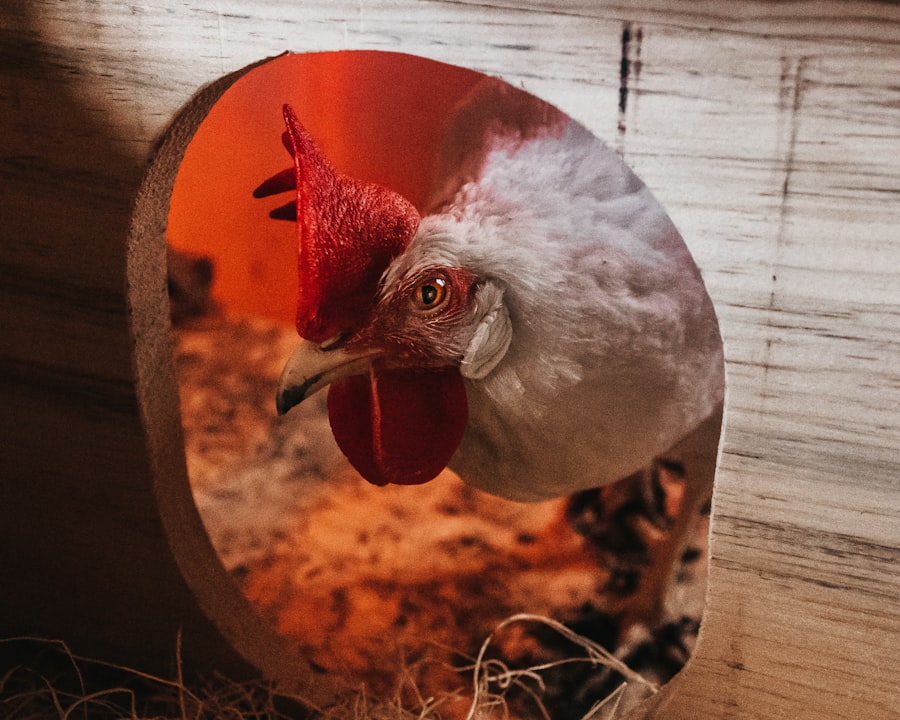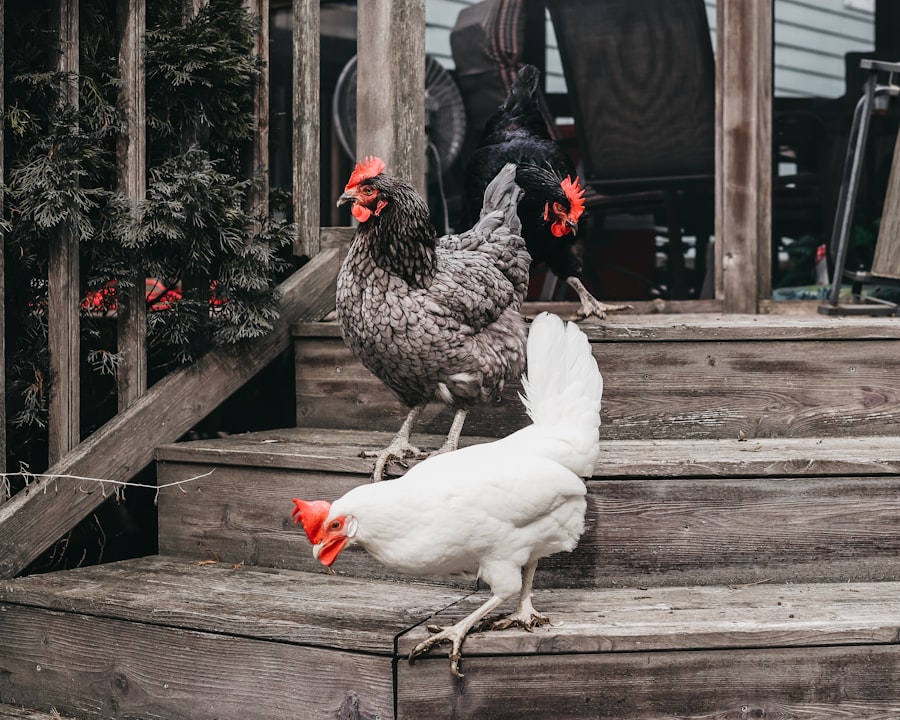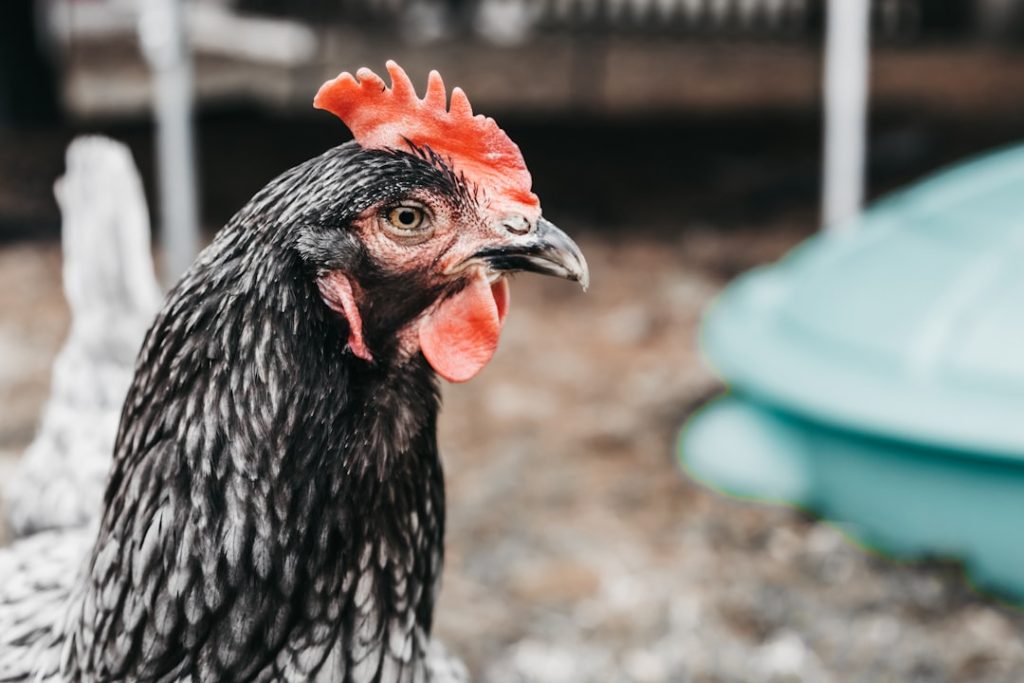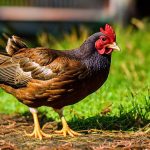Keeping chickens as backyard poultry can be both rewarding and challenging. One significant threat to domestic chicken flocks is the presence of hawks. Hawks are raptors with exceptional vision and hunting skills, posing a considerable risk to free-range chickens.
The potential for hawk attacks often causes concern among chicken owners, who worry about their birds’ safety. This article examines hawk behavior, outlines strategies for protecting chickens from these aerial predators, and provides guidance on developing an effective hawk deterrent plan. Additionally, it addresses the options of seeking professional assistance and exploring legal measures to manage hawk-related problems.
By gaining a thorough understanding of hawk behavior and implementing appropriate deterrent methods, chicken keepers can enhance the security and welfare of their flocks.
Table of Contents
Key Takeaways
- Hawks pose a significant threat to backyard chicken owners
- Hawks are opportunistic hunters and will target chickens as easy prey
- Use physical barriers and deterrents to protect chickens from hawk attacks
- Implement a comprehensive plan to deter hawks from targeting your chickens
- Seek professional assistance and legal measures if hawk attacks persist
Understanding the behavior of hawks
Hawk Characteristics and Hunting Techniques
Hawks are birds of prey known for their sharp talons, powerful beaks, and exceptional eyesight. They are skilled hunters that primarily feed on small mammals and birds, making backyard chickens an attractive target. Hawks are known for their stealthy hunting techniques, often swooping down from above to catch their prey by surprise.
Hawk Behavior and Identification
They are also known to perch in high vantage points, scanning the area for potential meals. Understanding the behavior of hawks is crucial for chicken owners looking to protect their flock. By recognizing the signs of hawk activity, such as circling overhead or perching in nearby trees, owners can take proactive measures to safeguard their chickens.
Protecting Your Flock from Hawks
It’s also important to note that hawks are protected under federal law, making it illegal to harm or kill them without proper permits. With this in mind, chicken owners must find non-lethal methods for deterring hawks from targeting their flock.
Protecting your chickens from hawks

There are several strategies that chicken owners can employ to protect their flock from hawks. One of the most effective methods is to provide adequate shelter and cover for the chickens. This can include secure coops and runs with roofs to prevent aerial attacks.
Additionally, using netting or wire mesh over the top of the run can help deter hawks from swooping down on the chickens. Another option is to provide hiding spots within the chicken’s outdoor area, such as dense shrubbery or small structures that the chickens can seek refuge in if a hawk is spotted. It’s also important to avoid leaving food and water out in the open, as this can attract not only hawks but other predators as well.
By taking these precautions, chicken owners can significantly reduce the risk of hawk attacks on their flock. Another effective method for protecting chickens from hawks is to supervise free-ranging time. Allowing chickens to roam freely during peak hawk activity times can increase their vulnerability to attacks.
Instead, consider providing supervised free-ranging time when hawks are less active, such as early in the morning or late in the afternoon. This allows chickens to enjoy some outdoor time while minimizing the risk of encountering a hawk. Additionally, using scare tactics such as loud noises or visual deterrents like reflective objects or predator decoys can help deter hawks from approaching the chicken’s living area.
By implementing these protective measures, chicken owners can create a safer environment for their flock and reduce the likelihood of hawk attacks.
Creating a hawk deterrent plan
Creating a comprehensive hawk deterrent plan is essential for protecting a backyard chicken flock. This plan should include a combination of physical barriers, scare tactics, and environmental modifications to minimize the risk of hawk attacks. One effective strategy is to install motion-activated lights or sprinkler systems near the chicken’s living area.
These devices can startle hawks and deter them from approaching the flock. Additionally, using noise-making devices such as wind chimes or predator calls can help create an environment that is less appealing to hawks. Another option is to plant dense vegetation around the chicken’s living area to provide natural cover and hiding spots for the birds.
By creating a diverse and dynamic environment, chicken owners can make it more challenging for hawks to target their flock. It’s also important to consider the behavior of other potential predators in the area when creating a hawk deterrent plan. By addressing all potential threats, chicken owners can create a more comprehensive and effective protection strategy for their flock.
Regularly inspecting the chicken’s living area for any potential weak spots or vulnerabilities is also crucial for maintaining a secure environment. By staying vigilant and proactive, chicken owners can significantly reduce the risk of hawk attacks and create a safer space for their flock to thrive.
Seeking professional help
In some cases, dealing with hawk-related issues may require seeking professional help. Wildlife experts and bird control specialists can provide valuable insight and guidance on managing hawk activity in the area. These professionals can assess the situation and recommend specific deterrent strategies tailored to the unique needs of the chicken owner’s property.
They may also offer services such as installing bird netting or other physical barriers to prevent hawk attacks. Additionally, wildlife experts can provide education on local bird laws and regulations, ensuring that chicken owners remain in compliance while addressing hawk-related concerns. Another option for seeking professional help is to consult with local agricultural extension offices or poultry organizations.
These resources often have valuable information and expertise on predator management strategies specific to chickens and other poultry. By reaching out to these organizations, chicken owners can gain access to valuable resources and support in addressing hawk-related issues.
Taking legal measures

Understanding Local Bird Laws and Regulations
Despite best efforts to deter hawks from targeting a chicken flock, legal measures may need to be taken to address persistent issues. It’s essential for chicken owners to familiarize themselves with local bird laws and regulations regarding hawks and other protected bird species. In many areas, it is illegal to harm or kill hawks without proper permits or authorization.
However, there may be legal avenues available for addressing ongoing hawk-related problems. One option is to contact local wildlife authorities or conservation agencies to report ongoing issues with hawks in the area. These agencies may be able to provide guidance on legal measures that can be taken to address persistent hawk activity that poses a threat to chickens and other domestic animals.
Documenting Evidence and Exploring Non-Lethal Deterrents
Additionally, documenting any incidents or evidence of hawk attacks on the flock can be valuable in supporting legal efforts to address the issue. In some cases, obtaining permits for non-lethal deterrent methods such as bird netting or sound devices may be necessary to effectively protect a chicken flock from hawks. By working within the bounds of local bird laws and regulations, chicken owners can address hawk-related concerns while remaining in compliance with legal requirements.
Conclusion and final thoughts
In conclusion, protecting a backyard chicken flock from hawks requires a combination of understanding hawk behavior, implementing effective deterrent strategies, seeking professional help when needed, and taking legal measures when necessary. By recognizing the signs of hawk activity and creating a comprehensive deterrent plan, chicken owners can significantly reduce the risk of hawk attacks on their flock. Providing adequate shelter and cover for chickens, supervising free-ranging time, and using scare tactics are all effective methods for protecting chickens from hawks.
Seeking professional help from wildlife experts and bird control specialists can provide valuable support and guidance in managing hawk-related issues. Additionally, understanding local bird laws and regulations is crucial for addressing hawk-related concerns while remaining in compliance with legal requirements. By taking proactive measures and staying informed about effective deterrent strategies, chicken owners can create a safer environment for their flock and minimize the risk of hawk attacks.
With careful planning and vigilance, it is possible to coexist with hawks while ensuring the safety and well-being of backyard chickens.
If you’re struggling with hawks preying on your chickens, you may want to consider building a more secure chicken coop. Poultry Wizard offers a helpful article on A-Frame Chicken Coops that could provide the protection your flock needs. By investing in a sturdy coop like the one described in the article, you can help keep your chickens safe from predators like hawks.
FAQs
What is a hawk?
A hawk is a bird of prey known for its sharp talons, keen eyesight, and hunting abilities. There are many species of hawks found around the world.
Why do hawks eat chickens?
Hawks are carnivorous and hunt for small animals, including chickens, as part of their natural diet. Chickens are easy prey for hawks due to their size and vulnerability.
How can I protect my chickens from hawks?
To protect your chickens from hawks, you can use physical barriers such as netting or wire mesh to cover the chicken coop or run. Additionally, providing overhead cover or shelter for the chickens can help reduce the risk of hawk attacks.
Is it legal to harm or kill hawks to protect my chickens?
In many countries, hawks are protected under wildlife conservation laws, and it is illegal to harm or kill them. It is important to explore non-lethal methods of protecting your chickens from hawks.
What are some non-lethal methods to deter hawks from attacking my chickens?
Non-lethal methods to deter hawks from attacking chickens include using scare tactics such as visual deterrents like shiny objects or predator decoys, as well as sound deterrents like noise-making devices. Additionally, providing hiding spots and cover for the chickens can make them less vulnerable to hawk attacks.
Meet Walter, the feathered-friend fanatic of Florida! Nestled in the sunshine state, Walter struts through life with his feathered companions, clucking his way to happiness. With a coop that’s fancier than a five-star hotel, he’s the Don Juan of the chicken world. When he’s not teaching his hens to do the cha-cha, you’ll find him in a heated debate with his prized rooster, Sir Clucks-a-Lot. Walter’s poultry passion is no yolk; he’s the sunny-side-up guy you never knew you needed in your flock of friends!







